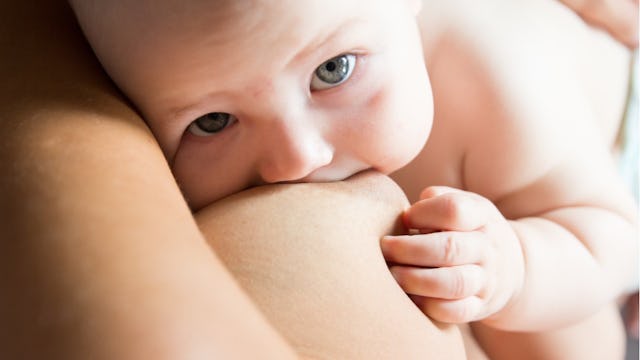Newly Discovered Sugars In Breast Milk May Protect Babies Against Group B Strep

We have all heard breast milk referred to as “liquid gold,” and it’s not just because it has an awesome balance of nutrition for babies. Breast milk contains live cells that offer some pretty amazing immunological and antiviral protections for babies and has been shown to lower their rates of common infections and diseases.
Of course, not all mothers choose to breastfeed or are able to. Whether or not a mom breastfeeds, she transfers some immunities to her baby via the placenta during pregnancy, which is fantastic. And it’s definitely important to note that experts say any amount of breast milk — even a few drops — is helpful and protective to babies, especially in the early weeks and months when they are most vulnerable to illness.
In some ways, we know a whole lot about the healing powers of breast milk, but in many ways, researchers have just scratched the surface of the ways breast milk protects our babies. For example, for many years, researchers thought that all those incredible antimicrobial agents were found on the protein components of breast milk. But it seems they were wrong, as newly published research out of Vanderbilt University indicates.
The new study, published in ACS Infectious Diseases this past June, shows that some powerful antibacterial agents are found in the carbohydrate, or sugar components, of breastmilk (yay for sugar and carbs!) and not just the proteins. Not only that, these newly discovered breast milk carbs were found to be highly protective against group B streptococcus (GBS), a bacteria that can lead to sepsis, pneumonia, meningitis, or even death if a newborn contracts it.
“This is the first example of generalized, antimicrobial activity on the part of the carbohydrates in human milk,” Steven Townsend, assistant professor of chemistry and director of the study, tells Infection Control Today. “One of the remarkable properties of these compounds is that they are clearly non-toxic, unlike most antibiotics.”
In fact, one of the motivations behind the study was that the researchers wanted to address the problem of our growing resistance to antibiotics. The CDC reports that antibiotic resistance contributes to about 23,000 deaths each year (which is pretty terrifying). And the researchers were hoping to find some answers to this scary problem by studying breast milk’s antimicrobial properties.
“We started to look for different methods to defeat infectious bacteria,” Townsend tells Infection Control Today. “For inspiration, we turned to one particular bacteria, group B strep. We wondered whether its common host, pregnant women, produces compounds that can either weaken or kill strep, which is a leading cause of infections in newborns worldwide,” Townsend said.
Well, the results were pretty staggering. The researchers isolated breast milk carbohydrates (called oligosaccharides) from samples of breast milk, added them to strep cultures, and then observed the results under a microscope. Unsurprisingly, it turns out that breastmilk has some pretty kick-ass methods in place to basically destroy group B strep.
Check it out: Not only do the breast milk carbs kill group B strep bacteria directly, but they also break down the biofilm that surrounds the bacteria. Pretty freaking cool.
“Our results show that these sugars have a one-two punch,” says Townsend. “First, they sensitize the target bacteria and then they kill them. Biologist sometimes call this ‘synthetic lethality’ and there is a major push to develop new antimicrobial drugs with this capability.”
Women’s bodies are amazing.
But it’s not just group B strep that these breast milk carbohydrates can break down and destroy. According to Infection Control Today, the researchers have tested other infectious bacteria and are seeing similar results. Two of these are part of the “ESKAPE” pathogens, which are among the leading causes of hospital infections throughout the world.
The researchers have some more work ahead of them though. Now they need to isolate the specific type of carbohydrate molecule in breast milk that is performing this magic and hopefully one day harness its power for further good.
As Science Alert reports, although the research is still in its infancy, the researchers are hoping that one day, these breast milk carbs can help us lessen our reliance on antibiotics. “If you can figure out how the sugars are acting, then you can justify attempting to make large-scale amounts of them, and then putting them in humans,” Townsend tells Science Alert.
Whatever happens with this groundbreaking piece of research, we know for sure that these bacteria-fighting components are being made every day by women’s bodies for their babies — and the more we know about the awe-inspiring ways that women’s bodies work, the more freaking proud we all should be.